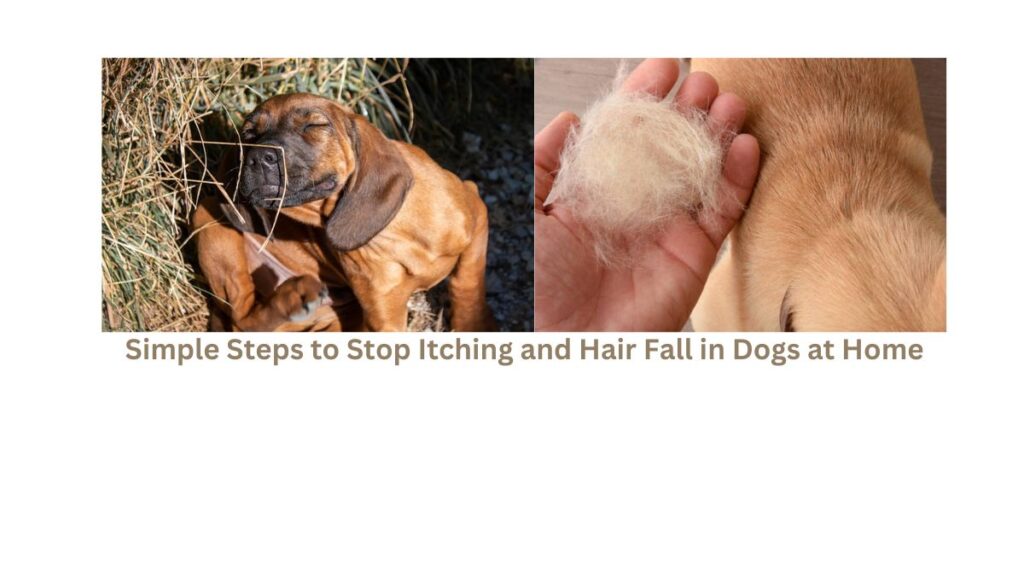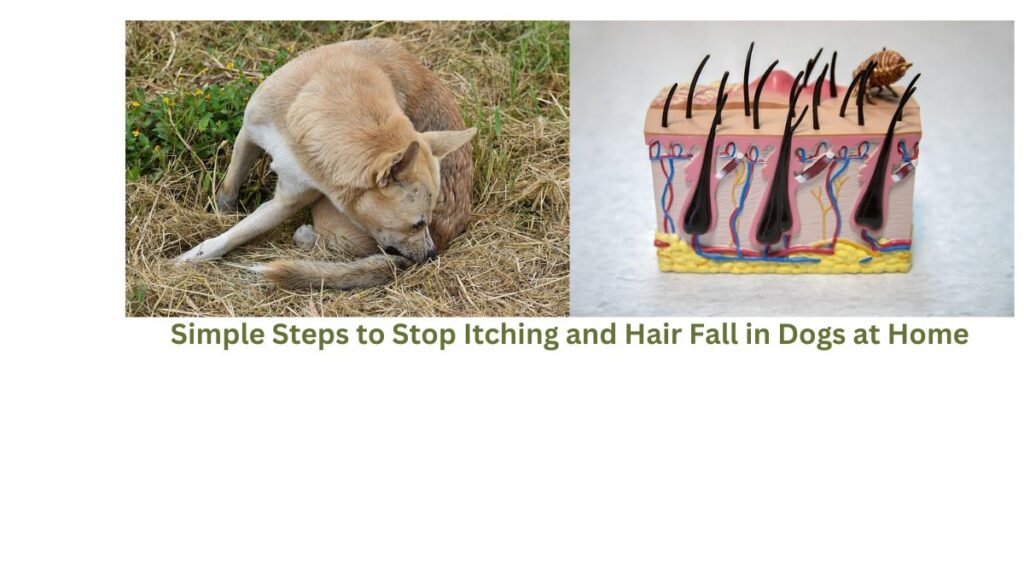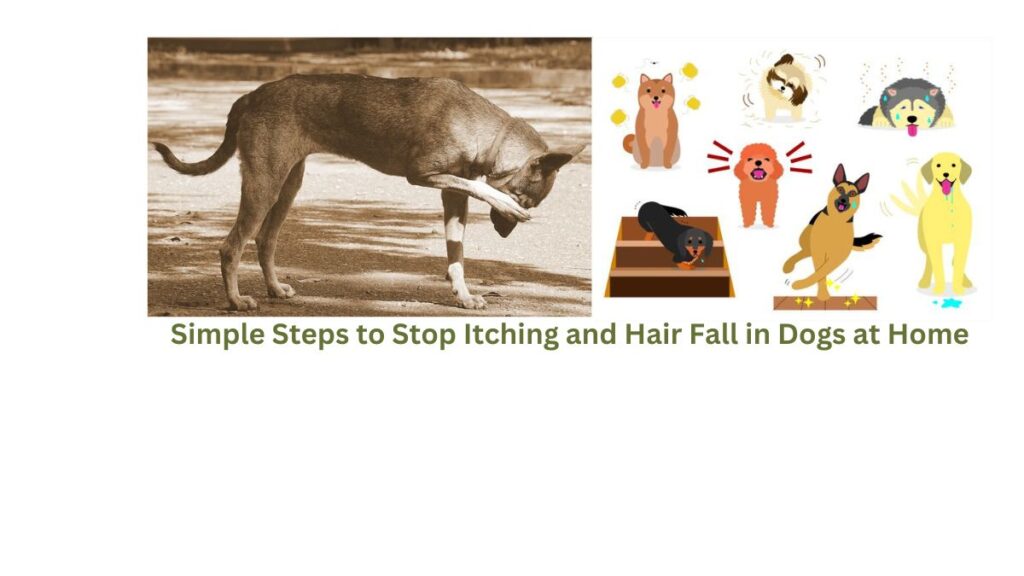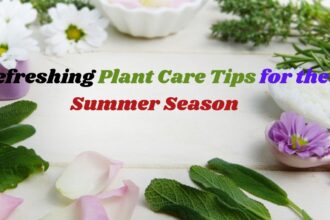Introduction:
“Simple Steps to Stop Itching and Hair Fall in Dogs at Home”

Dealing with itching and hair fall in our beloved canine companions can be distressing. Fortunately, there are simple steps you can take at home to alleviate these issues and ensure your dog’s comfort and well-being. In this article, we’ll explore effective methods to address itching and hair fall in dogs without the need for expensive treatments or visits to the vet.
What to do if your dog is losing hair and itching?
Simple Steps to Stop Itching and Hair Fall
If your dog is losing hair and itching, it’s essential to take action to address these symptoms promptly. Here are steps you can take:

- Consult a Veterinarian: The first and most crucial step is to schedule an appointment with your veterinarian. Hair loss and itching can be caused by various underlying medical conditions, including allergies, skin infections, parasites (such as fleas or mites), hormonal imbalances, or autoimmune diseases. Your vet can perform a thorough examination, conduct diagnostic tests if necessary, and provide an accurate diagnosis.
- Follow Veterinarian’s Recommendations: Once the veterinarian has diagnosed the underlying cause of your dog’s hair loss and itching, follow their recommendations for treatment. This may include medications such as antihistamines or antibiotics for infections, topical treatments for skin conditions, dietary changes, or allergy management strategies.
- Maintain Regular Grooming: Keeping your dog’s coat clean and well-groomed can help alleviate itching and prevent further hair loss. Brush your dog regularly to remove loose fur, dirt, and debris, and bathe them with a gentle, hypoallergenic shampoo recommended by your veterinarian.
- Implement Flea and Tick Prevention: If fleas or ticks are contributing to your dog’s itching and hair loss, use veterinarian-recommended flea and tick prevention products to eliminate these parasites and prevent future infestations.
- Address Environmental Allergens: If your dog is allergic to environmental allergens such as pollen or dust mites, take steps to minimize exposure. Keep your home clean, use air purifiers, and avoid outdoor activities during peak allergy seasons.
- Maintain a Healthy Diet: Ensure your dog is receiving a balanced and nutritious diet to support overall health and skin condition. Your veterinarian can recommend an appropriate diet based on your dog’s age, breed, and any underlying health issues.
- Provide Comfort: While your dog is undergoing treatment, provide comfort and relief from itching. Avoid using harsh chemicals or irritants on your dog’s skin, provide soft bedding, and consider using cool compresses or soothing oatmeal baths to alleviate itching.
- Monitor Progress: Keep track of your dog’s symptoms and monitor their progress closely. If there are any changes or worsening of symptoms, consult your veterinarian promptly for further evaluation and adjustments to the treatment plan.
By taking proactive steps and working closely with your veterinarian, you can effectively manage your dog’s hair loss and itching and improve their quality of life.
What is the best home remedy for dog’s itchy skin?
There are several home remedies that can help alleviate itching in dogs. However, it’s important to note that the effectiveness of these remedies may vary depending on the underlying cause of the itching. Here are some commonly recommended home remedies for itchy skin in dogs:

- Oatmeal Bath: Oatmeal has soothing properties that can help relieve itching and irritation in dogs’ skin. You can make an oatmeal bath by grinding plain, unflavored oats into a fine powder and mixing it with warm water to create a soothing paste. Bathe your dog with this mixture, gently massaging it into their skin, and then rinse thoroughly.
- Apple Cider Vinegar Rinse: Apple cider vinegar has antibacterial and antifungal properties that can help alleviate itching and soothe irritated skin. Dilute apple cider vinegar with water (1 part vinegar to 1 part water) and use it as a rinse after bathing your dog. Be sure to avoid applying vinegar to any open wounds or sores, as it may sting.
- Coconut Oil: Coconut oil is a natural moisturizer that can help hydrate dry, itchy skin and reduce inflammation. Apply a small amount of coconut oil to your dog’s skin, focusing on areas that are particularly dry or irritated. Be sure to use virgin or unrefined coconut oil, and monitor your dog for any signs of sensitivity or allergic reaction.
- Chamomile Tea: Chamomile tea has anti-inflammatory properties that can help soothe itchy skin in dogs. Brew a strong chamomile tea, allow it to cool, and then apply it to your dog’s skin using a clean cloth or cotton ball. Alternatively, you can add chamomile tea to your dog’s bath water for a soothing soak.
- Aloe Vera: Aloe vera gel has cooling and moisturizing properties that can provide relief from itching and irritation in dogs’ skin. Use pure, unscented aloe vera gel and apply it directly to your dog’s skin, focusing on areas that are itchy or inflamed. Be sure to avoid aloe vera products that contain added ingredients such as alcohol, which can be drying and irritating to the skin.
- Omega-3 Fatty Acids: Adding omega-3 fatty acid supplements to your dog’s diet can help improve skin health and reduce itching. You can find omega-3 supplements specifically formulated for dogs at pet stores or consult your veterinarian for recommendations on dosage and administration.
- Regular Baths: Keeping your dog clean with regular baths using a gentle, hypoallergenic shampoo can help remove allergens and irritants from their skin and coat, reducing itching and discomfort.
It’s important to remember that while home remedies can provide temporary relief from itching, they may not address the underlying cause of the problem. If your dog’s itching persists or worsens despite home treatment, it’s best to consult your veterinarian for a proper diagnosis and treatment plan.
What are the market products available for hair fall and itching in pet dogs?
There are numerous products available on the market specifically formulated to address hair fall and itching in pet dogs. These products vary in their formulations, active ingredients, and application methods. Here are some common types of products available:

- Medicated Shampoos: Medicated shampoos designed for dogs often contain ingredients such as oatmeal, aloe vera, tea tree oil, or hydrocortisone, which can help soothe irritated skin and reduce itching. Some medicated shampoos also contain antifungal or antibacterial agents to treat underlying skin infections that may be contributing to itching and hair loss.
- Topical Treatments: There are various topical treatments available for dogs that target itching and hair loss. These treatments may come in the form of sprays, mousses, gels, or spot-on solutions. They often contain ingredients such as hydrocortisone, lidocaine, or antihistamines to provide relief from itching and inflammation.
- Flea and Tick Control Products: Fleas and ticks can cause significant itching and hair loss in dogs, so using effective flea and tick control products is essential. These products may include spot-on treatments, oral medications, collars, or sprays that kill and repel fleas and ticks, thereby reducing itching and preventing further hair loss.
- Supplements: There are various dietary supplements available for dogs that promote skin and coat health. These supplements often contain ingredients such as omega-3 fatty acids, biotin, zinc, or vitamin E, which can help improve skin condition and reduce shedding. Supplements come in various forms, including soft chews, tablets, or liquid formulations.
- Allergy Relief Products: If your dog suffers from allergies that contribute to itching and hair loss, there are allergy relief products available that can help alleviate symptoms. These products may include antihistamines, corticosteroids, or immunomodulators prescribed by a veterinarian to manage allergic reactions and reduce itching.
- Skin Care Wipes: Skin care wipes designed for dogs are convenient for spot cleaning and soothing irritated skin. These wipes often contain gentle, hypoallergenic ingredients that can help remove allergens, dirt, and debris from your dog’s skin while providing relief from itching and inflammation.
- Prescription Medications: In some cases, veterinarians may prescribe prescription medications to treat severe itching and hair loss in dogs. These medications may include oral antihistamines, corticosteroids, or immune-suppressing drugs to manage underlying skin conditions or allergies.
When selecting products for your dog’s itching and hair loss, it’s essential to consult with your veterinarian to determine the underlying cause of the problem and identify the most appropriate treatment options. Your veterinarian can provide personalized recommendations based on your dog’s specific needs and medical history. Additionally, always follow the manufacturer’s instructions and dosage recommendations when using any pet care products.
Conclusion:
By following these simple steps, you can effectively prevent itching and hair fall in your dog at home. Remember to prioritize your dog’s well-being and consult with your veterinarian if you have any questions or concerns about your dog’s skin and coat health. With proper care and attention, you can help your dog look and feel their best for years to come.





